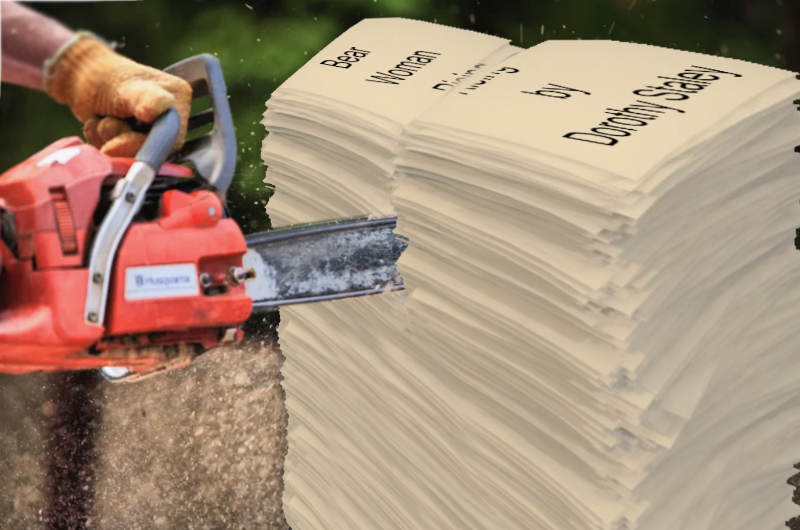Fifteen years ago I handed my bulky, single-spaced first draft of Bear Woman Rising to Marjorie Abrams, the mystery writer in our critique group, who bravely agreed to read it. After several weeks, somewhat bleary eyed, she heaved it into my arms and said, “I got bogged down in back story. Sorry.” As well she should have since the behemoth manuscript contained nearly 190,000 words.
Embarrassed and discouraged, I needed time to lick my wounds before I summoned the courage to take a knife to my precious words, or more appropriately rev up my proverbial chain saw. Ultimately, over the course of the next dozen years, I managed to eliminate approximately 70,000 words. But that first cut bled the most. As painful as it was to remove a good chunk of my heroine’s family history from the original story line, all was not lost. I had the good sense to save those 30,000 words for possible incorporation into a prequel novel.
That left me a good 40,000 words over the 120,000-word limit that I had set for my novel. Where next to weld my knife? Help came from Patti Walker who had edited several beginning chapters of an early draft. She suggested that I eliminate most of my character’s thoughts which appeared in italics. Patti pointed out that readers could figure out what a character is thinking from what that character is saying and doing. She was spot on, I realized as I paged through the manuscript deleting italicized sentences left and right. When I finished, I felt I had jettisoned a ton of unnecessary verbiage.
During the cutting process, I began to see the wisdom of crediting readers with smarts enough to get my meaning without being hit over the head. I began searching the remaining 150,000 word manuscript for places where I over explained. As a retired school teacher, I tended to do that. But my audience wasn’t 7th grade students. For one thing, I found repetitive dialogue, and although it may have reflected the way a character talked, it hammered home a thought that didn’t need hammering. The adage, less is more, came to mind and out came the knife one more time.
With thousands of excess words still cluttering my manuscript, I asked my copy editor, Heath Silberfeld, if there were any parts of the book she felt could be eliminated. She suggested one chapter that although interesting, did not move the story forward. I agreed with her. When I viewed my novel as a literary road map, I found that the chapter in question was a side trip. Again all was not lost because I turned that deleted chapter into a short story. And seeing how well it stood on its own, I looked for other side trips. I didn’t find any more full length chapters, but did find many passages which served to detour the reader rather than to move the story forward. Out they came.
In June of 2019, spurred to cut the remaining glut of about 20,000 words by the realization that at age 78, I wasn’t getting any younger, I attacked the manuscript one last time. This time I read it out loud. After several days I acquired a rhythm, and my ears picked up excess words more easily. Hearing rather than seeing gave me enough distance from the printed page to make those final bloodless cuts. Finally, in August 2019, I handed my manuscript to Inword Publishers knowing I’d done my best and would indeed live long enough to see Bear Woman Rising in print—all 116,000 words.



